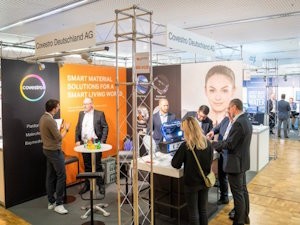LOPEC 2024: Printed electronics serving patients

LOPEC, the world’s leading exhibition and conference for flexible, organic and printed electronics, will be held in Munich from March 5 to 7, 2024. Under the focus topic of Smart Living, companies and researchers will show how printed electronics is making the health sector fit for the future.
Visitors to LOPEC 2024 can look forward to a wide range of innovations. “The high number of new exhibitors and the generally good booking situation show that printed electronics is increasingly moving toward specific industrial applications and everyday products,” says Armin Wittmann, Exhibition Director of LOPEC. One focus is on innovations in the health sector. “Printed electronics devices are so thin, light, flexible, and reliable that they open up unimagined possibilities for medical technology,” explains Dr. Klaus Hecker, Managing Director of the LOPEC co-organizer OE-A (Organic and Printed Electronics Association), an international working group within VDMA.
Wearables for health monitoring
The sensor socks from LOPEC exhibitor Metafas, for example, support the care of people with health impairments who have difficulty expressing their needs. Printed sensors in the socks measure skin conductance, which depends primarily on sweat secretion. Through an AI-supported evaluation, the socks detect whether a patient is feeling well or stressed. Application shows that socks are better accepted than sensors affixed to the skin. They are also washable and hence more sustainable. Alongside Metafas, there are many other LOPEC exhibitors involved in printed electronics for health monitoring and the required materials, including Covestro, Henkel, Heraeus, IEE, and InnovationLab.
Smart labels for more security
Electronic labels for packaging and devices are also increasingly gaining ground in the healthcare sector. With RFID, NFC and Bluetooth technology they enhance brand protection and patient safety. Such labels can automatically document the administration of a medicine and moreover allow better monitoring of the supply chain. LOPEC exhibitor Witte Technology offers digital seals as well. Via ultra-fine printed electronic loops, they register product manipulations, which they report to the smartphone via an NFC interface.
Research highlights
In addition to successful applications of printed electronics, LOPEC is presenting groundbreaking innovations from research. Thanks to printed electronics, organ-on-chip systems, for example, aimed at replacing animal testing, have become an unbeatable tool for accelerating drug discovery and drug development. Scientists from the Dutch Holst Centre are working on such chips. Other research institutions presenting at LOPEC include VTT Technical Research Centre Finland, Austria’s Joanneum Research Forschungsgesellschaft, Portugal’s CeNTI – Centre for Nanotechnology and Smart Materials, and, from Germany, several Fraunhofer Institutes and the Leibniz Institute for New Materials. Research highlights can also be found at the LOPEC Conference. For example, Bernd Grimm of the Luxembourg Institute of Health will give a plenary talk on printed sensors in orthopedic rehabilitation.
Essential for the digital future
In addition, under the focus topic of Smart Living, LOPEC will present innovations for the sports and entertainment sector, and for sustainable energy and building technology. “Printed electronics literally makes our lives lighter and is essential for the digitalization of society,” Hecker points out. Wittmann stresses that its potential is far from exhausted: “We are pleased that LOPEC is helping to reduce the time-to-market for this sustainable technology.” The diverse program is aimed at both printed electronics newcomers and insiders, and covers the entire value chain from material development and printing systems, to the end product.
The next LOPEC takes place in Munich from March 5-7, 2024 (exhibition: March 6 and 7, 2024).
The original Press Release
(image: © Messe München GmbH)




